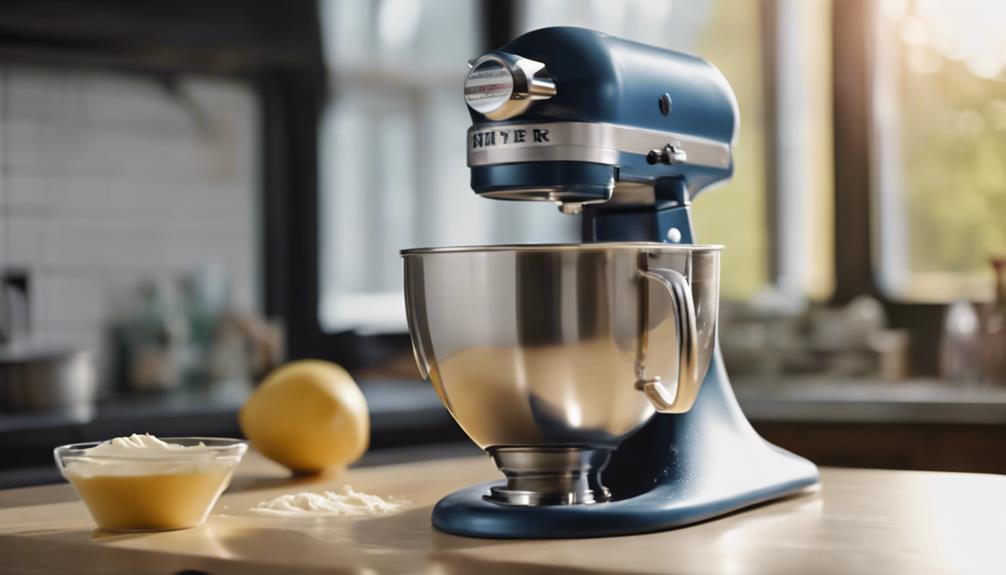Some peanut butter brands like Go Nuts, Hanks Protein Plus, and Nuts 'n More contain xylitol, which is highly toxic to dogs. If your dog ingests xylitol, it can cause severe symptoms like vomiting, weakness, and seizures. Always check ingredient labels to avoid xylitol exposure and keep your pet safe. Opt for xylitol-free brands such as Crazy Richard's and CB's Nuts. If you suspect your dog has consumed xylitol, contact a veterinarian immediately. Understanding which products are safe can prevent serious health issues for your furry friend. Want to make sure you're fully protecting your pet?
Key Takeaways
- Brands like Go Nuts, Hanks Protein Plus Peanut Butter, and Nuts 'n More contain xylitol, which is toxic to dogs.
- Xylitol can cause severe symptoms like vomiting, seizures, and hypoglycemia in dogs.
- Always check ingredient labels for xylitol or sugar alcohols before purchasing peanut butter.
- Choose safe, xylitol-free brands like Crazy Richard's and CB's Nuts for your pets.
- Contact a veterinarian immediately if your dog ingests peanut butter containing xylitol.
Understanding Xylitol
Although it's a common sugar substitute, xylitol is extremely toxic to dogs and can cause serious health issues. This sugar alcohol, often found in sugar-free gum, candies, and even some peanut butter brands, poses a significant risk to your furry friend.
When dogs ingest xylitol, their bodies can't metabolize it properly. This leads to a rapid drop in blood sugar levels, known as hypoglycemia, which can result in symptoms like vomiting, weakness, and even seizures.
It's pivotal to check ingredient labels on any product before giving it to your dog. Xylitol might be listed under various names, so being vigilant is essential.
If you suspect your dog has consumed something containing xylitol, prompt veterinary care is necessary to prevent severe consequences, such as liver failure.
Peanut Butter Toxicity

When choosing peanut butter for your dog, always check the label for xylitol. Brands like Go Nuts, Hanks Protein Plus Peanut Butter, and Nuts 'n More contain this toxic ingredient, which can cause vomiting, weakness, and seizures.
Opt for xylitol-free alternatives to keep your pet safe.
Identify Toxic Brands
Check the labels of peanut butter brands like Go Nuts, Nuts N More, and P28, as they contain xylitol, which is toxic to dogs. Xylitol toxicity is a serious risk for your furry friends, and these brands that contain xylitol should be kept far away from your pet's diet.
Even a small amount of xylitol can lead to severe health issues in dogs, including hypoglycemia and liver damage.
When you're shopping for peanut butter, always scrutinize the ingredient list. Many labels now clearly state if xylitol is included, but it's vital to be vigilant. Brands like Go Nuts, Nuts N More, and P28 may seem harmless but can pose a grave threat to your dog's health.
In fact, cases of xylitol poisoning in dogs have more than doubled since 2007, with over 3,725 calls received by the ASPCA last year alone.
Preventing xylitol toxicity starts with awareness. Make it a habit to check every label and stay informed about which brands contain xylitol. This small step can make a big difference in keeping your dog safe and healthy.
Symptoms of Poisoning
Recognizing the symptoms of xylitol poisoning is pivotal to guaranteeing your dog receives prompt medical attention. When a dog ingests peanut butter containing xylitol, symptoms of poisoning can appear rapidly, often within 30 minutes. Initial signs include vomiting, lethargy, and diarrhea. These symptoms occur because xylitol causes a rapid drop in blood sugar levels, leading to hypoglycemia.
If left untreated, the situation can quickly worsen. Your dog might collapse or even experience seizures as the toxicity affects their central nervous system. The severity of these symptoms underscores the importance of immediate veterinary care. Even small amounts of xylitol can be dangerous, so it's crucial to be vigilant and act swiftly.
Monitoring your dog closely after they consume any peanut butter is essential. If you notice any signs of xylitol poisoning, contact your veterinarian right away. Quick action can make a significant difference in your dog's recovery. Don't wait for symptoms to escalate—early intervention is key.
Safe Alternatives
Choosing dog-friendly peanut butter without xylitol is essential to safeguard your furry friend's health and safety. Some peanut butter brands are safe and offer minimal ingredients, making them excellent choices for your dog. Crazy Richard's and CB's Nuts are two reliable brands that don't include xylitol as an ingredient. These brands focus on simplicity, usually containing just peanuts and maybe a bit of salt.
Homemade peanut butter can also be a fantastic alternative. It's easy to make and guarantees you know exactly what's inside. Simply blend unsalted peanuts until creamy, and you've got a safe, dog-friendly treat.
When giving your dog peanut butter, remember to follow feeding guidelines. Overindulgence can lead to health issues like obesity and pancreatitis. Always check the label for xylitol as an ingredient, as some companies have responded to its dangers by either removing it or adding clear warnings.
Here's a quick comparison of safe peanut butter options:
| Brand | Key Features |
|---|---|
| Crazy Richard's | Minimal ingredients, no xylitol |
| CB's Nuts | Simple, natural ingredients |
| Homemade | Full control of ingredients |
Brands With Xylitol

You should be aware that certain peanut butter brands like Go Nuts, Co., Nuts N More, and P28 contain xylitol, which is harmful to dogs.
Recognizing these brands is essential because even small amounts of xylitol can cause serious health issues, including vomiting, lethargy, and seizures.
To keep your pets safe, always check labels and opt for peanut butter brands that are free of xylitol.
Identifying Xylitol-Containing Brands
Several peanut butter brands, like Go Nuts, Co., Nuts N More, and P28, contain xylitol, which poses a significant risk to dogs. When selecting peanut butter, it's vital to read the labels carefully. Xylitol is a sugar substitute that's safe for human consumption but can be deadly for dogs, even in small amounts.
You might think peanut butter is a harmless treat for your furry friend, but brands like Go Nuts, Co., Nuts N More, and P28 often include xylitol in their ingredients. This sweetener can lead to severe health issues for your dog. It's important to check the ingredients list for xylitol before sharing any peanut butter with your pet.
Some common signs that a peanut butter contains xylitol include labels that advertise it as 'sugar-free' or 'low-calorie.' These products often use xylitol to replace traditional sugars. Always be watchful and double-check the ingredients.
To keep your dog safe, avoid giving them any peanut butter from brands known to contain xylitol. Opt for natural peanut butter with no added sweeteners. This simple step can help prevent a potential emergency and safeguard your dog's health and well-being.
Symptoms of Xylitol Poisoning
Recognizing the symptoms of xylitol poisoning in your dog is essential for prompt and effective treatment. Xylitol can cause a rapid and dangerous drop in your dog's blood sugar levels, often within just 30 minutes after ingestion. Common symptoms of xylitol poisoning include vomiting, lethargy, diarrhea, collapse, and seizures. These signs are vital indicators that something is seriously wrong.
Here's a quick reference table to help you identify the symptoms:
| Symptom | Description | Timeframe |
|---|---|---|
| Vomiting | Frequent or severe vomiting | Early (30 mins) |
| Lethargy | Unusual drowsiness or lack of energy | Early (30 mins) |
| Diarrhea | Loose, watery stools | Early to Mid |
| Collapse | Sudden loss of strength | Mid to Late |
| Seizures | Convulsions or trembling | Mid to Late |
If you notice any of these symptoms of xylitol poisoning, rush your dog to the veterinarian immediately. Quick and professional treatment is vital to saving their life. Avoid attempting home remedies, as incorrect treatments can worsen the situation. Always keep an eye on the ingredients in your dog's treats and avoid anything that contains xylitol.
Safe Peanut Butter Options
Knowing which peanut butter brands contain xylitol can help you make safer choices for your dog's health. Brands like Go Nuts, Co., Nuts N More, and P28 are known to include xylitol, a sugar substitute that can be very harmful to dogs. Xylitol can cause severe health issues such as hypoglycemia and liver damage. If your dog consumes peanut butter with xylitol, immediate veterinary care is essential to prevent serious complications.
With xylitol poisoning cases on the rise, awareness is growing, and more companies are updating their labels. However, it's still vital to read the ingredient list carefully. Look for peanut butter brands that are explicitly labeled as safe for dogs, ensuring they don't contain xylitol or other harmful additives.
When shopping, consider brands that focus on pet safety. Some pet-specific peanut butters are formulated without harmful ingredients, making them a safer choice. Always double-check the label, even if it's a brand you trust.
Symptoms of Poisoning

If your dog ingests xylitol, watch for symptoms like vomiting, lethargy, and diarrhea. These symptoms of poisoning can appear as early as 30 minutes after ingestion. Xylitol is highly toxic to dogs because it stimulates the pancreas to release insulin, causing a rapid drop in blood sugar levels. This sudden change can lead to more severe symptoms such as incoordination, collapse, and even seizures if left untreated.
Initially, you might notice your dog suddenly becoming unusually tired or weak. Vomiting and diarrhea are common early signs that something is wrong. As the xylitol continues to affect your dog's system, the symptoms can quickly escalate. Lethargy can progress to incoordination, where your dog may seem unsteady or have trouble walking. In severe cases, they might collapse or suffer from seizures, which are medical emergencies.
It's vital to recognize these symptoms of poisoning early because the quicker you act, the better the chances of recovery. Keep a close eye on your dog if you suspect they've ingested xylitol, and be prepared to seek immediate veterinary care. Understanding these symptoms can be lifesaving for your furry friend.
Immediate Actions

Swift action is necessary if you suspect your dog has ingested peanut butter containing xylitol. First, contact a veterinarian or a pet poison control hotline immediately. They can provide specific instructions based on your dog's condition and the amount of xylitol ingested. Time is of the essence, so don't delay.
In some cases, inducing vomiting may be recommended, but only do this under professional guidance. Your vet might also instruct you to bring your dog in for immediate care. Monitoring liver values and blood sugar levels is vital, as xylitol can cause severe drops in blood sugar and potential liver damage. Your veterinarian will likely conduct blood tests to assess the impact.
Intravenous fluids with dextrose may be necessary to stabilize your dog's blood sugar levels and prevent further complications. This treatment helps flush out the xylitol from the system and supports overall recovery. Prompt veterinary intervention is essential to address xylitol poisoning in dogs and prevent severe health issues. Acting quickly can make a significant difference in your dog's recovery and overall health.
Always keep emergency contact numbers handy for such situations, and remain vigilant about what your pet consumes.
Safe Alternatives

To keep your dog safe, choose xylitol-free peanut butter brands like Crazy Richard's or CB's Nuts.
You could also make homemade peanut butter using just peanuts, ensuring a healthier option.
Always read ingredient labels carefully to avoid hidden dangers.
Xylitol-Free Peanut Butter Brands
When selecting peanut butter for your dog, opt for xylitol-free brands like Crazy Richard's and CB's Nuts, which offer safe, minimal-additive options. These xylitol-free peanut butter brands are excellent choices to avoid the dangers of xylitol, a sweetener that can be toxic to dogs. Xylitol can cause severe health issues, including hypoglycemia and even liver failure, so it's essential to select a safe alternative.
Other good options include No Cow and Hanks Protein Plus Nut Spreads, which have removed xylitol from their products specifically for pet safety. These brands are aware of the risks and have taken steps to make sure their products won't harm your furry friend. For added transparency, Nuts N More includes a warning about the dangers of xylitol to dogs on their FAQ page, showing their dedication to pet safety.
Limiting your dog's peanut butter intake to 10% of their daily calories can also help prevent health issues. By choosing safe, xylitol-free options and monitoring portions, you can treat your dog without worry.
Always check labels and stay informed to keep your pet healthy and happy.
Benefits of Homemade Options
In addition to choosing xylitol-free brands, making peanut butter at home offers a safe and customizable alternative for your dog's treats. By creating homemade peanut butter, you have full control over the ingredients and can guarantee there's no xylitol or other harmful additives. This gives you peace of mind, knowing exactly what your furry friend is consuming.
There are several benefits to making your own peanut butter:
- Ingredient Control: You can select high-quality nuts and avoid preservatives, salt, and sugar, ensuring a healthier product.
- Customization: Tailor the peanut butter to suit your dog's taste preferences by adding flavors they love, like a touch of honey or a sprinkle of cinnamon.
- Minimal Ingredients: DIY recipes typically require just peanuts, reducing the risk of unintended harmful additives.
- Fun and Rewarding: The process of creating homemade peanut butter can be a fun and rewarding experience, allowing you to bond with your pet.
Homemade peanut butter not only enhances your dog's diet but also provides you with a fulfilling activity. Remember, avoiding xylitol and upholding ingredient quality are key steps in keeping your pet healthy and happy.
Reading Ingredient Labels Carefully
Carefully reading ingredient labels guarantees your dog's peanut butter is free from harmful xylitol. Look closely at each ingredient list and avoid any product that mentions xylitol, a sweetener toxic to dogs. Many brands now highlight the absence of xylitol on their packaging, but it's always best to double-check.
Opt for safe alternatives like Crazy Richard's or CB's Nuts, which are known for their minimal ingredient lists. These brands provide peace of mind and keep your furry friend safe. Better yet, consider making homemade peanut butter. By blending plain peanuts, you control exactly what goes into your dog's treat, eliminating any risk of xylitol contamination.
Remember, while peanut butter can be a delightful snack for your dog, moderation is key. Too much can lead to pancreatitis and obesity. Experts recommend that treats should only make up about 10% of your dog's daily caloric intake.
Lastly, stay informed about companies responding to xylitol concerns. Some have started removing xylitol from their products or adding clear warnings about its dangers to dogs. Being watchful about ingredient labels ensures your pet stays happy and healthy.
Reading Labels

Always check the ingredient labels on peanut butter jars to spot any presence of xylitol. Reading labels is a pivotal step in ensuring the safety of your pets.
Xylitol is a common sweetener found in some peanut butter brands, and it's highly toxic to dogs. Here's how you can effectively read labels to protect your furry friends:
- Identify Common Brands: Brands like Go Nuts, Nuts N More, and P28 are known to sometimes include xylitol in their peanut butter. Always approach these with caution.
- Scan for Xylitol: When reading labels, look specifically for the word 'xylitol' in the ingredients list. It can sometimes be listed under 'sugar alcohols,' so be thorough.
- Check Natural and Organic Brands: Don't assume that natural or organic brands are free from xylitol. Even some health-focused products might contain this harmful ingredient.
- Stay Updated: Ingredient lists can change over time. Just because a brand didn't contain xylitol last month doesn't mean it's safe now. Always recheck the label each time you purchase.
Prevention Tips

To protect your pets, implement these prevention tips to avoid xylitol exposure. First, always read ingredient labels on peanut butter jars. This simple step can save your pet's life. Look specifically for xylitol, as even small amounts can be toxic.
Choose peanut butter brands that don't contain xylitol. Some brands clearly state they're xylitol-free, making your selection easier. When in doubt, opt for natural peanut butters that list only peanuts and a bit of salt as ingredients.
Store products containing xylitol securely. Keep them high up or in closed cabinets where pets can't reach. This includes not just peanut butter, but also sugar-free gum, candy, and other human foods that may contain xylitol.
Educate your family members and visitors about the dangers of xylitol. Make sure everyone in your household knows which products are unsafe for pets and why it's vital to keep them out of reach.
Always be watchful. Pets are curious and persistent. Regularly check areas where you store food and clean up any spills immediately.
Pet Poison Helpline

Should your pet accidentally ingest xylitol, the Pet Poison Helpline (800-213-6680) offers immediate, expert assistance. It's vital to act promptly if you suspect your dog has been exposed to xylitol. Consulting a veterinarian or contacting the Pet Poison Helpline can be life-saving. They'll guide you through the necessary steps to ensure your pet receives the best care possible.
Here are four essential actions to take if your pet ingests xylitol:
- Contact the Pet Poison Helpline immediately: Time is of the essence when dealing with xylitol poisoning. The experts at the Pet Poison Helpline can provide important guidance.
- Avoid home treatments: Don't attempt any home remedies without professional advice. Improper treatments can worsen the situation.
- Follow professional instructions: Whether you're speaking with a vet or the Pet Poison Helpline, adhere strictly to their recommendations.
- Keep xylitol-containing products out of reach: Prevention is key. Store items like sugar-free gum and certain peanut butters safely away from your pets.
The ASPCA underscores the importance of vigilance and education regarding xylitol sources. By staying informed and prepared, you can protect your furry friend from the dangers of xylitol.
Pet Care Resources

When it comes to keeping your pet happy and healthy, the Pet Care Resources library offers a wealth of valuable information. You can access a wide range of resources designed to guarantee your pet's well-being and health, covering everything from nutrition to general care.
As pet owners, it's important to stay informed about best practices in pet care. The Pet Care Resources library is a fantastic tool for this. Not only can you find detailed guidance on your pet's health and nutrition, but you can also explore various topics to enhance your understanding and support your pet's overall health.
Sharing this informative content with other pet owners is a great way to promote responsible pet care. By doing so, you contribute to a community of well-informed pet lovers who are dedicated to the well-being of their furry friends.
Whether you're a new pet owner or have years of experience, the Pet Care Resources library is an invaluable asset. Immerse yourself to find expert tips, advice, and the latest information to keep your pet in top shape. It's all about giving your pet the best life possible.
Frequently Asked Questions
Which Peanut Butters Contain Xylitol?
You should watch out for peanut butter brands like Go Nuts, Co., Nuts N More, and P28, as they contain xylitol. Always check the labels to guarantee you're not giving your dog something harmful.
Is Xylitol in Jif or Skippy Peanut Butter?
Jif and Skippy peanut butter don't contain xylitol, ensuring they're safe selections for your furry friend. Always check labels because other brands might include xylitol, which poses a perilous poison for pets. Stick with Jif or Skippy.
What Is the Safest Peanut Butter for Dogs?
The safest peanut butter for dogs is one without xylitol and minimal ingredients. Brands like Crazy Richard's and CB's Nuts are good choices. You can also make homemade peanut butter using just peanuts for added safety.
What Ingredient in Peanut Butter Isn T Safe for Dogs?
Xylitol is the wolf in sheep's clothing in peanut butter that's toxic to dogs. It causes a rapid drop in their blood sugar. If your dog consumes it, you need to seek immediate veterinary care.
Conclusion
Remember, a spoonful of peanut butter can either be your pet's delight or a dangerous gamble. Always check the labels, avoiding brands with xylitol like the plague.
If you notice any signs of poisoning, act swiftly and contact the Pet Poison Helpline. Prevention is your best defense, so stay informed and vigilant.
Your furry friend's health is in your hands – handle it with care and love.









